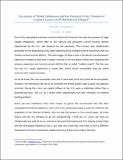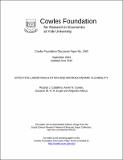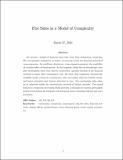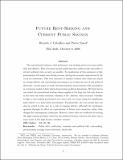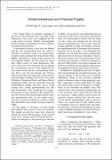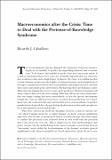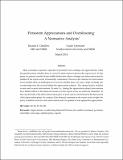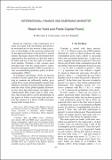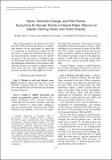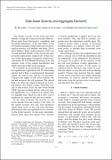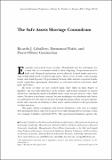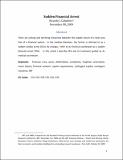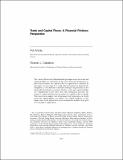Browsing MIT Open Access Articles by Author "Caballero, Ricardo J"
Now showing items 1-16 of 16
-
Aggregate Implications of Lumpy Investment: New Evidence and a DSGE Model
Bachmann, Rüdiger; Caballero, Ricardo J.; Engel, Eduardo M. R. A. (American Economic Association, 2013-10)The sensitivity of US aggregate investment to shocks is procyclical. The response upon impact increases by approximately 50 percent from the trough to the peak of the business cycle. This feature of the data follows naturally ... -
Discussion of “Global Imbalances and the Financial Crisis: Products of Common Causes, by M. Obstfeld and K. Rogoff”
Caballero, Ricardo J. (Federal Reserve Bank of San Francisco, 2009-10)One of the main global economic concerns before the financial crisis was the presence of large “global imbalances,” which refer to the massive and persistent current account deficits experienced by the U.S. and financed ... -
Effective labor regulation and microeconomic flexibility
Caballero, Ricardo J.; Cowan, Kevin N.; Engel, Eduardo M. R. A.; Micco, Alejandro (Elsevier, 2013-03)Microeconomic flexibility is at the core of economic growth in modern market economies because it facilitates the process of creative-destruction. The main reason why this process is not infinitely fast, is the presence ... -
Fire Sales in a Model of Complexity
Caballero, Ricardo J.; Simsek, Alp (American Finance Association/Wiley, 2013-11)We present a model of financial crises that stem from endogenous complexity. We conceptualize complexity as banks' uncertainty about the financial network of cross exposures. As conditions deteriorate, cross exposures ... -
Future rent-seeking and current public savings
Caballero, Ricardo J; Yared, Pierre (Elsevier, 2010-08)The conventional wisdom is that politicians' rent-seeking motives increase public debt and deficits. This is because myopic politicians face political risk and prefer to extract political rents as early as possible. In ... -
Global Imbalances and Financial Fragility
Caballero, Ricardo J.; Krishnamurthy, Arvind (American Economic Association, 2009-05)The United States is currently engulfed in the most severe financial crisis since the Great Depression. The crisis was triggered by the crash in the real estate “bubble” and amplified by the extreme concentration of ... -
Macroeconomics after the Crisis: Time to Deal with the Pretense-of-Knowledge Syndrome
Caballero, Ricardo J. (American Economic Association, 2010)The recent financial crisis has damaged the reputation of macroeconomics, largely for its inability to predict the impending financial and economic crisis. To be honest, this inability to predict does not concern me much. ... -
On the role of financial frictions and the saving rate during trade liberalizations
Caballero, Ricardo J.; Antras, Pol (MIT Press, 2010-04)We study how financial frictions and the saving rate shape the long-run effects of trade liberalization on income, consumption, and the distribution of wealth in financially underdeveloped economies. In our model, regardless ... -
Persistent Appreciations and Overshooting: A Normative Analysis
Lorenzoni, Guido; Caballero, Ricardo J. (Palgrave Macmillan Publishers, 2014-04)Most economies experience episodes of persistent real exchange rate appreciations, when the question arises whether there is a need for intervention to protect the export sector. This paper presents a model of irreversible ... -
Reach for Yield and Fickle Capital Flows
Caballero, Ricardo J; Simsek, Alp (American Economic Association, 2018-05)In Caballero and Simsek (2017), we develop a model of fickle capital flows and show that, when countries are similar, international flows create global liquidity and mitigate crises despite their fickleness. In this paper, ... -
Rents, Technical Change, and Risk Premia Accounting for Secular Trends in Interest Rates, Returns on Capital, Earning Yields, and Factor Shares
Caballero, Ricardo J; Farhi, Emmanuel; Gourinchas, Pierre-Olivier (American Economic Association, 2017-05)The secular decline in safe interest rates since the early 1980s has been the subject of considerable attention. In this short paper, we argue that it is important to consider the evolution of safe real rates in conjunction ... -
Safe Asset Scarcity and Aggregate Demand
Farhi, Emmanuel; Gourinchas, Pierre-Olivier; Caballero, Ricardo J (American Economic Association, 2016-05)We explore the consequences of safe asset scarcity on aggregate demand in a stylized IS-LM/Mundell Fleming style environment. Acute safe asset scarcity forces the economy into a "safety trap" recession. In the open economy, ... -
The Safe Assets Shortage Conundrum
Farhi, Emmanuel; Gourinchas, Pierre-Olivier; Caballero, Ricardo J (American Economic Association, 2017-08)A safe asset is a simple debt instrument that is expected to preserve its value during adverse systemic events. The supply of safe assets, private and public, has historically been concentrated in a small number of advanced ... -
The Safety Trap
Caballero, Ricardo J; Farhi, Emmanuel (Oxford University Press (OUP), 2017-02)In this article, we provide a model of the macroeconomic implications of safe asset shortages. In particular, we discuss the emergence of a deflationary safety trap equilibrium with endogenous risk premia. It is an acute ... -
Sudden Financial Arrest
Caballero, Ricardo J. (Palgrave Macmillan, 2010-07)There are striking and terrifying similarities between the sudden failure of a heart and that of a financial system. In the medical literature, the former is referred to as sudden cardiac arrest. By analogy, I refer to its ... -
Trade and Capital Flows: A Financial Frictions Perspective
Antras, Pol; Caballero, Ricardo J. (University of Chicago Press, 2009-08)The classical Heckscher‐Ohlin‐Mundell paradigm states that trade and capital mobility are substitutes in the sense that trade integration reduces the incentives for capital to flow to capital‐scarce countries. In this paper ...


